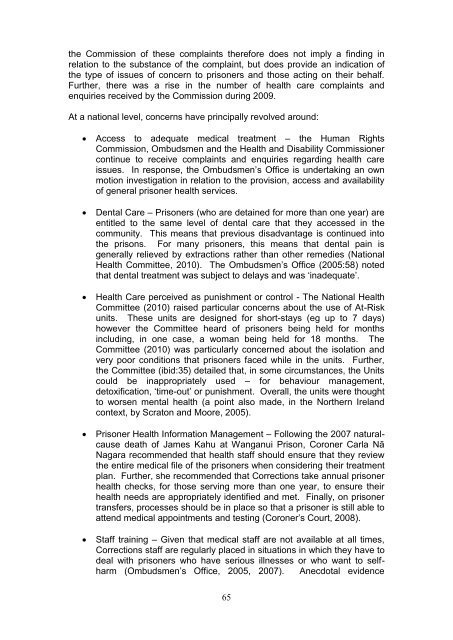Human Rights and Prisons - Rethinking Crime and Punishment
Human Rights and Prisons - Rethinking Crime and Punishment
Human Rights and Prisons - Rethinking Crime and Punishment
Create successful ePaper yourself
Turn your PDF publications into a flip-book with our unique Google optimized e-Paper software.
the Commission of these complaints therefore does not imply a finding in<br />
relation to the substance of the complaint, but does provide an indication of<br />
the type of issues of concern to prisoners <strong>and</strong> those acting on their behalf.<br />
Further, there was a rise in the number of health care complaints <strong>and</strong><br />
enquiries received by the Commission during 2009.<br />
At a national level, concerns have principally revolved around:<br />
<br />
<br />
<br />
<br />
<br />
Access to adequate medical treatment – the <strong>Human</strong> <strong>Rights</strong><br />
Commission, Ombudsmen <strong>and</strong> the Health <strong>and</strong> Disability Commissioner<br />
continue to receive complaints <strong>and</strong> enquiries regarding health care<br />
issues. In response, the Ombudsmen‟s Office is undertaking an own<br />
motion investigation in relation to the provision, access <strong>and</strong> availability<br />
of general prisoner health services.<br />
Dental Care – Prisoners (who are detained for more than one year) are<br />
entitled to the same level of dental care that they accessed in the<br />
community. This means that previous disadvantage is continued into<br />
the prisons. For many prisoners, this means that dental pain is<br />
generally relieved by extractions rather than other remedies (National<br />
Health Committee, 2010). The Ombudsmen‟s Office (2005:58) noted<br />
that dental treatment was subject to delays <strong>and</strong> was „inadequate‟.<br />
Health Care perceived as punishment or control - The National Health<br />
Committee (2010) raised particular concerns about the use of At-Risk<br />
units. These units are designed for short-stays (eg up to 7 days)<br />
however the Committee heard of prisoners being held for months<br />
including, in one case, a woman being held for 18 months. The<br />
Committee (2010) was particularly concerned about the isolation <strong>and</strong><br />
very poor conditions that prisoners faced while in the units. Further,<br />
the Committee (ibid:35) detailed that, in some circumstances, the Units<br />
could be inappropriately used – for behaviour management,<br />
detoxification, „time-out‟ or punishment. Overall, the units were thought<br />
to worsen mental health (a point also made, in the Northern Irel<strong>and</strong><br />
context, by Scraton <strong>and</strong> Moore, 2005).<br />
Prisoner Health Information Management – Following the 2007 naturalcause<br />
death of James Kahu at Wanganui Prison, Coroner Carla Nā<br />
Nagara recommended that health staff should ensure that they review<br />
the entire medical file of the prisoners when considering their treatment<br />
plan. Further, she recommended that Corrections take annual prisoner<br />
health checks, for those serving more than one year, to ensure their<br />
health needs are appropriately identified <strong>and</strong> met. Finally, on prisoner<br />
transfers, processes should be in place so that a prisoner is still able to<br />
attend medical appointments <strong>and</strong> testing (Coroner‟s Court, 2008).<br />
Staff training – Given that medical staff are not available at all times,<br />
Corrections staff are regularly placed in situations in which they have to<br />
deal with prisoners who have serious illnesses or who want to selfharm<br />
(Ombudsmen‟s Office, 2005, 2007). Anecdotal evidence<br />
65
















